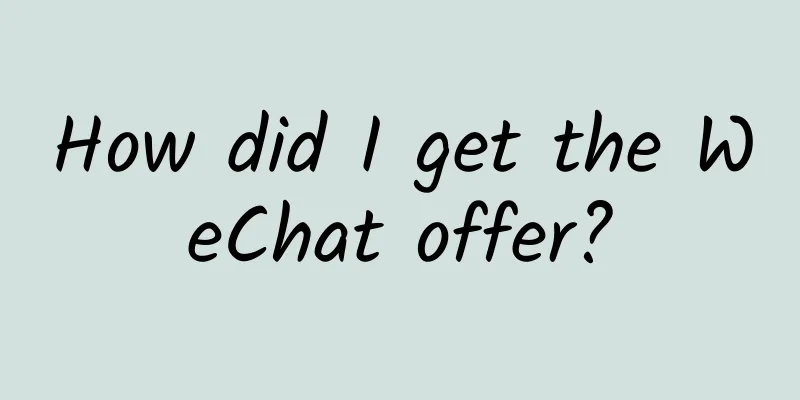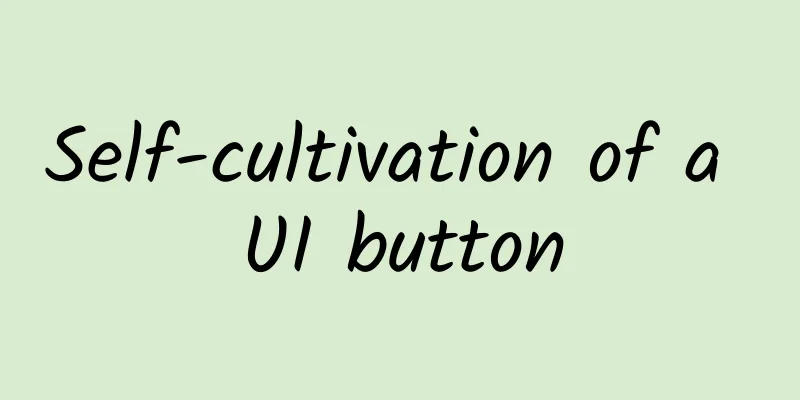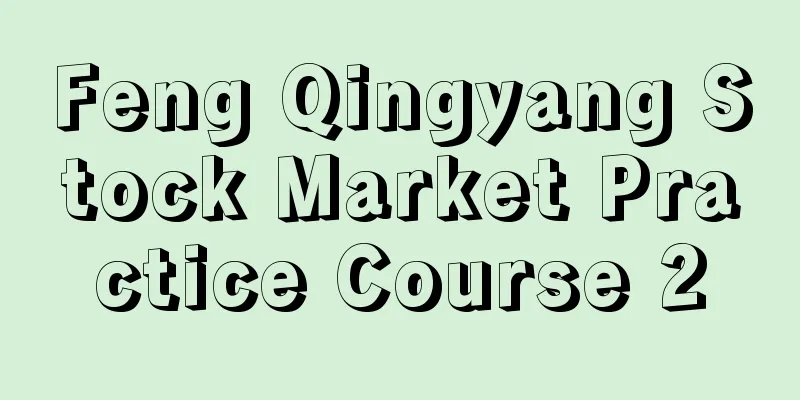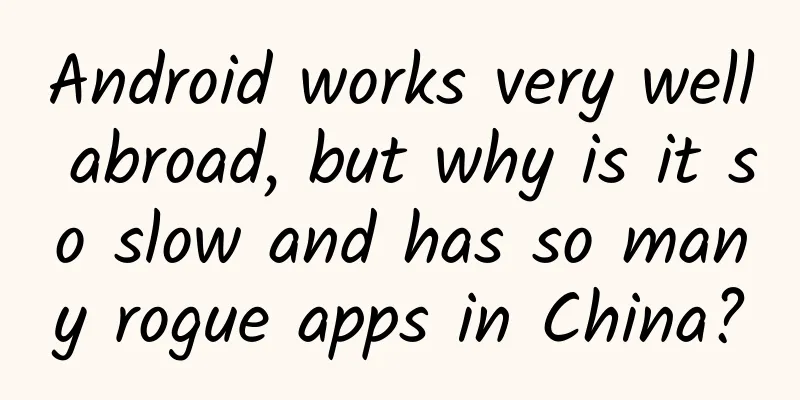How did I get the WeChat offer?

|
Hi, everyone. I’m Ji Xiaohua, the developer of this small column. Previously in the Android Technology Guide readers group, Shao Wen shared with us some “legends” about WeChat social recruitment, which aroused everyone’s strong curiosity about WeChat social recruitment. Today I’d like to push a paid article by Xiao Jian to everyone, “How did I get the WeChat offer?” The following is the full text: I'm sorry, everyone. Please forgive me for using such a "clickbait" title to attract you to read. "Android Interview Guide" This small column has already provided a "guide" for all aspects of Android development interviews. What's left to talk about is the interview experience. This article is also an interview experience, which I wrote on and off for a period of time. The difference from the last article is that this time I will focus on introducing the WeChat interview I experienced, my interview preparation and the interview experience. First of all, let me introduce myself. My online name is Xiaojian. I am a developer who appears and disappears in the domestic Android development circle. The applications I developed independently mainly include Shijing client and Shijing applet. I graduated from a 985 university in Beijing in 2016. I am currently an engineer in the Android client development team of Tencent WeChat. I have worked in the Meizu Flyme R&D Center and Tencent SNG Business Group, and have interned in the Taobao team of Alibaba Wireless Business Department. Maybe you have already seen that I joined WeChat through an internal transfer, which may be a relatively easy way to join the WeChat team at present. Below I will talk about the key points around the question "How did I get the offer from WeChat". You can just read it during your break. If you happen to be interviewing at WeChat, I hope the following content will be helpful to you. 1. Briefly explain Tencent’s internal transfer system In Tencent, internal transfers are called "live water", and everyone who meets the living water conditions can apply for positions in other departments within the company according to their personal wishes. In fact, when I applied for living water, I did not fully meet the conditions (I had worked for less than a year), but the HR lady was so nice that she let me submit my resume for an interview first, which gave me the opportunity to interview later. After going through the entire interview process, I met the living water conditions. I heard from Shao Wen that WeChat social recruitment requires 7-8 rounds of interviews, and the process is quite long and difficult. In comparison, the interview for internal transfers will be much easier than the external social recruitment interview. From the WXG new employee training I have experienced, there may be only 1 in 10 newcomers who came in through social recruitment, and most of them are students from other BGs. Moreover, the student with the most interview rounds actually went through 9 rounds of interviews. Please forgive me. 2. Briefly describe my entire interview process My entire interview process consisted of 5 rounds. The first 3 rounds were basically purely technical interviews, and the last 2 rounds were probably more focused on comprehensive ability assessments. WeChat has a special interview committee, referred to as the "Interview Committee", which is mainly responsible for checking the interview process of applicants. WeChat has more interview rounds mainly because there are interviews from several members of the Interview Committee in the middle. They are all heavyweights in the WeChat team, and their interview styles may be quite different. They may want to examine applicants from various angles. 3. What impressed me most about the WeChat interview What impressed me most about the technical interview of WeChat was that "the questions are not simple from the simplest to the most complex". For example, the interviewer asked me "Have you used a database?" I answered "Yes", and then the interviewer asked "Can you explain the principle of indexing?" In fact, I had not really studied it in depth at the time, so I guessed and answered "The database index is achieved through a balanced binary tree to achieve efficient search performance". From the interviewer's reaction, he was not satisfied with this answer, because I did not get to the point and failed to analyze it in depth. Some technical interview questions later were similar. If you are familiar with such questions, you can secretly rejoice. If you are not familiar with them, you will be embarrassed. Therefore, in fact, the questions of WeChat technical interview are from the simplest to the most complex, and the things asked by the interviewer are still things that we can see and use in our daily life, but we may not have taken the time to study them in depth or have not experienced real project practice. The shortcomings in this aspect will naturally be exposed during the interview. What impressed me the most about WeChat's comprehensive interview was that "the key content of the interview remains basically unchanged", which means that you will be asked about a project or a demand or an optimization that you wrote on your resume, which you have done and is most worth talking about. As a candidate, you must be fully prepared in this regard. I suggest that you first deliberately highlight this point in your resume so that the interviewer will notice it and want to ask you about it. Next, you need to prepare materials for this point. You can prepare from several aspects, such as "Why do you want to do this?", "How do you do this?", "What problems did you encounter during the period? How did you solve them?", "What actual results did you bring after you finished this?", "What happened after you finished? Did you continue to optimize and improve?", etc. The interview may be long, and the interviewer may ask you more than one point, so you may need to prepare for multiple points. At first, I didn't realize that I needed to be prepared in this regard. After 1-2 rounds of interviews, the interviewer reminded me that it was extremely important to be able to clearly and completely describe a certain job I had done during the interview process. Later, I went back and prepared well. In the next few rounds of interviews, my expression became clearer and clearer, and the interview process gradually began to move from calm to a climax. 4. Tips on how to prepare for a WeChat interview I have already talked about how to prepare for the comprehensive interview on WeChat. The main thing is to fully organize a certain job you have done, make sure you can clearly explain the cause and effect of this job, and have a clear understanding of the technical selection, difficult problems, solutions, optimization effects, in-depth improvements, etc. in the implementation process. I personally recommend writing these preparation materials into a summary for three reasons: First, the process of writing can help you sort out your thoughts and organize your words to avoid unclear expressions during the interview; second, you may ask yourself questions during the writing process, and these questions may become questions for the interviewer, so think carefully about how to answer; third, it is a good habit to write summaries from time to time. If you have a summary, some interviewers may ask you to send your summary to him. I worked in my original department for almost a year at that time. The main technical breakthrough work was the improvement and improvement of the React Native module. The main content of this has been written in my personal technical column "Sharing Experience in Upgrading RN on Android and iOS". If you are interested, you can read it. The rest is how to prepare for the technical interview of WeChat. After all, only by passing the technical interview can you move on to the comprehensive interview. But as you can see, the technical interview covers everything from basic Android development to advanced Android development. With so many technical points, what should we do? Here, I suggest reading books, open source projects, and interview summaries. For Android development books, I only recommend "Exploring the Art of Android Development" by Ren Yugang. If you have read it, please read it again. I have also read more in-depth Android development books, but I couldn't finish them because they were obscure and difficult to understand. In addition, I didn't need them for a while, and I forgot them after a while. I have also read more shallow Android development books, but I couldn't finish them because they didn't contain much information and wasted time. So for books, I only recommend "Exploring the Art of Android Development", which is an excellent book on Android development. It is suitable for engineers of all levels to read. It is easy to understand and practical. I wrote more than a dozen reading notes when I read it before. Whenever I have an interview, I will take the time to read those reading notes again. If you are interested, you can read "Reading Notes on Exploring the Art of Android Development". Open source projects are mentioned here. If you want to interview for WeChat, you must be familiar with WeChat's open source projects. If you have time, you can look at the source code. I know that you may not be able to fully understand it, but at least you should understand its general implementation principle. For example, the famous Tinker, Mars, or AndResGuard. I have used AndResGuard in my work, so I read its source code. The interviewer also asked me about this during the interview and asked me to explain its implementation principle. As for interview summaries, there are many on the Internet. You can find some popular interview summaries, such as our Android Interview Guide column. Here I would like to remind you that you are not recommended to believe everything when reading. If you find any problems, then check the information to confirm, because there are many outdated or wrong contents in the interview summaries on the Internet. In fact, I have also compiled interview summaries. I started compiling them when I was recruited on campus, and later I jumped from Meizu to Tencent, and then to internal transfer. I read my own interview summaries. If you are interested, you can read the Android development interview summary. After reading this, you may have discovered that what I read were all my own summaries. What are the benefits of this? The content is more suitable for me. The more I don’t understand, the more likely it is that it will appear in my summary. After reading more, I have basically digested those difficult points of knowledge. Therefore, reading your own summary not only does not take a lot of time, but is also more targeted and efficient. I strongly recommend that you write more summaries of your own. 5. How to prepare for algorithm interviews Algorithms were not mentioned before. Does WeChat interview not include algorithms? No, there must be an algorithm interview. Because I was interviewed in a different place, my interview process was to make an appointment with the interviewer to start the algorithm interview. The interviewer sent me the algorithm questions, and I answered them within an hour and sent the code to the interviewer. The two algorithm questions I did at that time should be medium-difficulty questions on LeetCode. The answering process was relatively smooth and I finished it about 20 minutes in advance. Before the algorithm interview, I prepared for the algorithm and used the weekend to brush up on about dozens of LeetCode algorithm questions. When I was recruiting on campus, there were less than 200 LeetCode questions, and I brushed almost all of them at that time. Now it is not easy to finish brushing them before the interview. Here I would like to share with you my preparation process for the algorithm interview. I have previously written "Android Interview Guide - Algorithm Interview Experience" in the small column of the Android Development Interview Guide. In fact, it should be no problem to prepare for the algorithm interview according to that article, but that article is about boring algorithms after all, and I guess not many people will really calm down and read it. My own preparation process for the algorithm is like this. The algorithm foundation is obtained by reading the "Python Data Structure and Algorithm Series" that I summarized before. Because it was written by myself and I have read it repeatedly several times, I finished it quickly. After reading it, I started to practice questions. This time was different from usual. Usually, I would find popular questions under various types of questions in LeetCode to do, but this time I first spent money to buy the online course "Playing Algorithm Interviews - From Real Questions to Thinking to Comprehensively Improve Algorithm Thinking". I practiced while reading it. It can be said that this money is worth it. Sometimes it is necessary to pay for knowledge. The instructor of this course categorizes various problems in algorithm interviews and makes them into topics to break them down one by one. This course is more suitable for programmers like me who are not from an algorithm background, but are only familiar with basic data structures and common algorithms, but have never made any breakthroughs in algorithms. Perhaps this course will help you make a breakthrough. 6. Talk about your experience working at WeChat I haven't been at WeChat headquarters for long, but the people and things I've seen during this period are really refreshing. The working environment is in TIT Creative Park, which is surrounded by green trees and has good air. There is no need to squeeze in the elevator to go to and from get off work here, because there are only a few floors. Three meals a day are free, and the food in the cafeteria changes every day. The important thing is that the technical atmosphere here is really good, the development process is also very standardized, and many people are very good at technology, very smart, and very nice. They will answer all the questions I have as a rookie. This makes me feel like I'm back to my graduate school days, being a primary school scumbag among many academic masters, studying hard, and making progress every day. OK, the above is the WeChat interview experience I want to share with you this time. If you are interested, you can contact me for internal recommendation. I am located at WeChat headquarters in Guangzhou. Let’s make a great product to please ourselves! |
<<: Girl, why do you want to program?
>>: iOS 12 wish list: These are the features Apple fans want
Recommend
Twitter officially launches Periscope. Can it compete with Meerkat?
[[130843]] The popularity of the video live strea...
Brand promotion: How to lay out the content marketing matrix?
First of all, let’s make it clear: Although the u...
Dalian home improvement mini program agent price inquiry, how much is the Dalian home improvement mini program agent price?
What is the price of Dalian home improvement mini...
The two core elements of product promotion: content and channels
Product promotion is a difficult problem. It look...
How much bandwidth is required to rent an IDC cabinet?
What are the criteria for choosing cabinet rental...
Zhihu promotion and traffic generation skills!
There is a saying that is often circulated on the...
Yazun: The beginning of the new year - Taobao and Tmall are planning a new starting point, dismantling industry opportunities from different dimensions
Yazun: The beginning of the new year - Taobao and...
APP promotion: Where do users come from for new products with no money to promote?
How to cold start a product with no people, no mo...
Peter's short video column: How to find video materials. How to make a hit video. How to publish a hit video
Peter's short video column: How to find video ...
Teacher Wen's Reading Comprehension Class on Douyin
Resource introduction of Teacher Wen's "...
Baidu search promotion main process function upgrade
1. Background The main process of Baidu's sea...
A must-read for operators: What is the conversion rate of attracting new customers through SMS?
SMS marketing is the standard for notifications o...
How does this content sharing community achieve user growth?
Using Jianshu V2.11.2, draw the product structure...
0-year-old product manager: How to write a requirements document
[[156712]] As a new product person, after joining...
How to fully plan a screen-sweeping event?
“Behind every successful case, there is a methodo...









